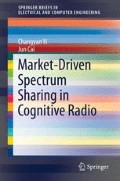Abstract
In this chapter, we consider a more complicated scenario of spectrum sharing with multiple spectrum sellers. In this model, a CR network with multiple heterogeneous POs and SUs is considered. Each PO has a different amount of spectrum to lease in different specific areas, and has a different users’ (PUs’) activity. Each SU has heterogeneous requirements in terms of spectrum demands and attitudes toward POs’ potential spectrum recall. Obviously, in this case, spectrum sharing needs to jointly consider both spectrum allocation and individual strategies. However, solving such a joint optimization problem is challenging due to the facts that (1) PUs’ activities are random and heterogenous among all POs; and (2) before the spectrum allocation has been done, it is impossible to know the quantity of spectrum recalled from each SU. In order to deal with the high computational complexity involved in solving such problem, we introduce a new method called Two-stage resource allocation scheme with combinatorial auction and Stackelberg game in spectrum sharing (TAGS) mechanism [1], which decomposes the solution into two separate stages. In the first stage, a suboptimal spectrum allocation is derived by formulating a combinatorial spectrum auction without considering the potential spectrum recall. Based on the winner determination in the first stage, each PO then decides a maximum amount of spectrum that may be recalled in the second stage, and each winning SU claims a payment reduction so as to offset the risk of utility degradation. Such a decision making process is viewed as a Stackelberg pricing game, and the best strategies for both POs and SUs are figured out accordingly. Theoretical and simulation results demonstrate that TAGS mechanism is efficient in increasing the spectrum utilization and economically feasible for all participants.
The rest of this chapter is organized as follows: Sect. 4.2 describes the system model and summarizes all important notations used in this chapter. Section 4.3 presents the first stage of TAGS mechanism, i.e., the combinatorial spectrum auction. A recall-based pricing game is formulated in Sect. 4.4 to study the strategy decision process in the second stage of TAGS. Section 4.5 shows the analyses of some desired economic properties and a detailed time-line of the TAGS mechanism. Simulation results are illustrated in Sect. 4.6. Finally, a brief summary is given in Sect. 4.7.
Access this chapter
Tax calculation will be finalised at checkout
Purchases are for personal use only
References
C. Yi, J. Cai, Two-stage spectrum sharing with combinatorial auction and stackelberg game in recall-based cognitive radio networks. IEEE Trans. Commun. 62(11), 3740–3752 (2014)
L. Gao, Y. Xu, X. Wang, MAP: multiauctioneer progressive auction for dynamic spectrum access. IEEE Trans. Mobile Comput. 10(8), 1144–1161 (2011)
D. Xu, E. Jung, X. Liu, Efficient and fair bandwidth allocation in multichannel cognitive radio networks. IEEE Trans. Mobile Comput. 11(8), 1372–1385 (2012)
P. Lin, J. Jia et al., Dynamic spectrum sharing with multiple primary and secondary users. IEEE Trans. Veh. Technol. 60(4), 1756–1765 (2011)
L.A. Wolsey, G.L. Nemhauser, Integer and Combinatorial Optimization (Wiley, New York, 2014)
S. Martello, P. Toth, Knapsack Problems: Algorithms and Computer Implementations (Wiley, New York, 1990)
C. Yi, J. Cai, Combinatorial spectrum auction with multiple heterogeneous sellers in cognitive radio networks, in Proceedings of the IEEE ICC, June 2014, pp. 1626–1631
R.B. Myerson, Game Theory: Analysis of Conflict (Harvard University, Cambridge, 1991)
R. Yates, A framework for uplink power control in cellular radio systems. IEEE J. Sel. Areas Commun. 13(7), 1341–1347 (1995)
S. Jayaweera, T. Li, Dynamic spectrum leasing in cognitive radio networks via primary–secondary user power control games. IEEE Trans. Wireless Commun. 8(6), 3300–3310 (2009)
H. Lin, M. Chatterjee, S. Das, K. Basu, ARC: an integrated admission and rate control framework for competitive wireless CDMA data networks using noncooperative games. IEEE Trans. Mobile Comput. 4(3), 243–258 (2005)
M. Xiao, N. Shroff, E. Chong, Utility-based power control in cellular wireless systems, in Proceedings of the IEEE INFOCOM, 2001, pp. 412–421
J. Zhang, Q. Zhang, Stackelberg game for utility-based cooperative cognitive radio networks, in Proceedings of the ACM MobiHoc, 2009, pp. 23–31
Author information
Authors and Affiliations
Rights and permissions
Copyright information
© 2016 The Author(s)
About this chapter
Cite this chapter
Yi, C., Cai, J. (2016). Two-Stage Spectrum Sharing Mechanism. In: Market-Driven Spectrum Sharing in Cognitive Radio. SpringerBriefs in Electrical and Computer Engineering. Springer, Cham. https://doi.org/10.1007/978-3-319-29691-3_4
Download citation
DOI: https://doi.org/10.1007/978-3-319-29691-3_4
Published:
Publisher Name: Springer, Cham
Print ISBN: 978-3-319-29690-6
Online ISBN: 978-3-319-29691-3
eBook Packages: EngineeringEngineering (R0)

